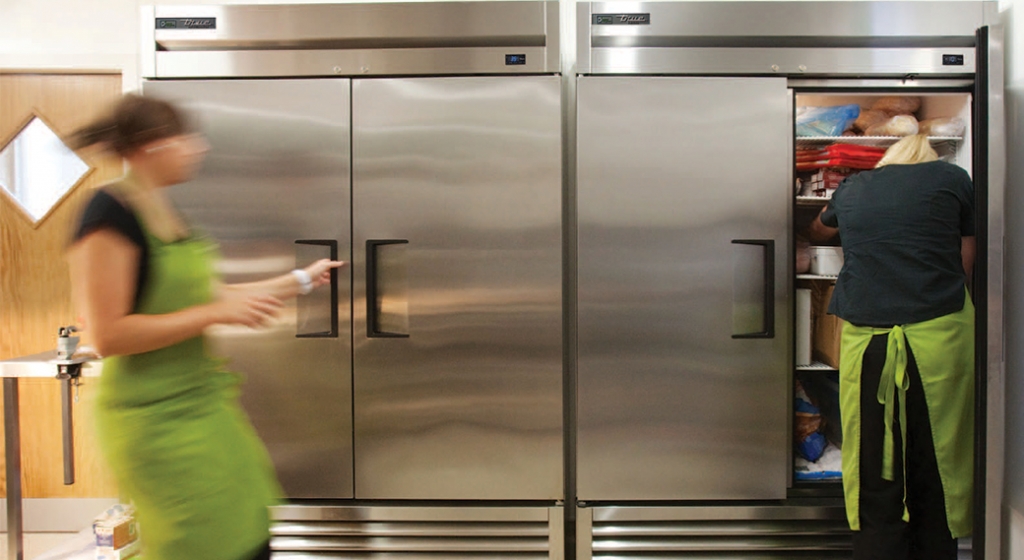Short answer: Yes, the location of your refrigerator compressor could potentially matter a lot.
Longer Answer: The compressor placement depends on a number of factors including the placement of the piece of equipment within your physical facility and the type of business being serviced by the refrigerator.
But let’s start with the basics so you can truly understand how to make the best choice for your situation.
What is a Compressor?
Your refrigerator’s compressor is one of the most important components. It’s so important that it typically has a separate warranty specification from the rest of the refrigerator unit. But why is it so important and what does it do?
At its most basic level, a compressor is like a pump. Its job is to increase the pressure of the liquid refrigerant. It pulls in air and increases the pressure of the refrigerant that is driven through the system.
The other two key pieces of the refrigerator system are the condenser coils and the evaporator coils.
As the compressor raises the pressure, the refrigerant heats up and becomes gaseous. It is then passed through the coils on the outside of the refrigerator. Since the gas in the coils is warmer than the air outside, the gas in the coils is cooled and returns to a liquid state. This high pressure liquid is then sent through the coils on the inside of the unit and the refrigerant absorbs the heat from the air inside the refrigerator.
From here, the refrigerant evaporates and is sent back through the compressor where the whole process starts again.
So, basically, your refrigerator is technically pulling out heat rather than putting “cold” into the unit.
>> Explore our Refrigerator & Freezer Buying Guide >>
Air Flow is Key
As you can see from our very simple explanation above, air flow plays a major role at several points in the process of cooling your refrigerator. And this is where your first decision point comes into play.
Because air is pulled into the system, you need to be aware of what else may get pulled in with that air. Dust and other particulate matter (think: flour if you are a bakery for example) can easily be pulled into the system. This can collect on the coils and can block airflow to the compressor, especially if the compressor is mounted close to the floor.
So you might think that a top mounted compressor is the way to go to avoid this issue. But depending on your usage and the placement of the unit in the kitchen, a top-mount compressor can have issues of its own. For example, if you will be using the refrigerator near a cooking line, grease-laden vapors rise from being heated and can be pulled into the compressor as well.
Top Shelf or Bottom Shelf?
Another factor to consider is the top shelf or bottom shelf is more important to your business and employees. This might not be obvious at first, but it can be very important for some.
When the compressor is mounted on the bottom of the unit, the shelves of the unit will be raised. This means that the top shelf will be higher. Shorter employees may have difficulty accessing the top shelf in this case. And if you are storing heavy or delicate items, it may be more difficult to access the top shelf in these cases.
But if the compressor is mounted on the top, then the shelves will be shifted down. The lowest shelf will be closer to the ground. While this may be better for some individuals, taller employees may find themselves stooping to access the contents of the lowest shelf.
Serviceability
One more thing to consider is the ease of access to the compressor for service. If you take care of your unit properly, you can enjoy years of uninterrupted use of your refrigerator. But if you do ever need to have service done, the location of the compressor can make a difference. Top mounted compressors may be more difficult to access and thus, make repairs slightly less convenient.
Bottom mounted units typically mean that maintenance and repair can be performed without the need for a ladder. Most professionals will tell you that the bottom mount units are somewhat easier when it comes to repair access.
Which One is Right for You?
Still confused as to which type of unit is right for you? Take our quick quiz to walk through all the main decision points.




Is it any problem with the refrigerator back side compressor and inbuilt compressor..
Hi Abdul! You typically see backside compressors on sandwich prep units (or similar), not on full size commercial reach-in refrigerators and freezers. Is there a model you’re looking at in particular that we can help you with? Thanks!
So I’m putting a double sided refrigerator in my kitchen with only cabinets top and bottom of the left side of the refrigerator. So in needing to know if I need a top or bottom compressor
Hi Melissa! We recommend you go with a bottom-mount compressor. Please give us a call if you have more questions – we’re happy to help find you the right refrigerator: 614-737-8431
Thanks!
Best 8 do fridge freezers have separate compressors – ethanadvisors.com